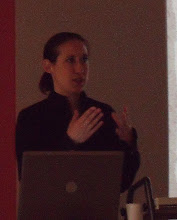A Vision Betrayed: The Jesuits in Japan and China, 1542-1742 Andrew Ross, Edinburgh 1994.
Just bookmarking a great and informative book with a big chapter on Matteo Ricci.
Qu Rukuei came to have a warm affection for Ricci and Matteo for him.
This is a direct quote from page 125 of said book. Ricci was a magnificent man, but I did not know his spell extended to modern scholars to such an extent.
Dear Dr. Ross, we seem to share an obsession :D
It is better to refute than to hate; and it is better still to use clear reasoning than to refute ... merely with many words.
this is probably my favourite quote by Matteo Ricci, but I am still looking for the source
středa 31. března 2010
středa 17. března 2010
The Value of Knowledge and Confusion of the Polyglot
I've just finished reading Konrad Paul Liessmann's Theorie der Unbildung. Die Irrtümer der Wissensgesellschaft (Theory of non-education. The errors of the Information Society) - it's a very pessimistic, but also a very wise book.
Liessmann has a sharp understanding of the problems of the current European reforms of university education. He sees how, within the last few years, universities have given up their quest for knowledge and aim at rankings, money and fame instead. He explains how building "elite" universities and creating "elite" projects cannot work if your concept of "elite" rests on superficial effectiveness, ability to attract private investment and immediate rentability of research.
He shows how the Humboldtian ideal of the educated man, and humanist education, is being consciously discarded, and how the current market-oriented scholarship needs "workers of science" rather than freethinkers and independent minds who are able of breakthrough discoveries in all disciplines regardless of funding or political situations.
Universities are becoming service institutions. Science is being made a maid of commerce.
It's a dark picture indeed.
I have been astounded to find in his book references to a topic that I have been thinking about a lot since having moved to Germany, namely, the predominance of English in science and scholarship and its consequences. If I read his statement that when non-native speakers are forced to work in another language from early on, it may limit their thinking and it will definitely limit their ability to express themselves, I would have vehemently opposed him.
Since I had to start writing, teaching and thinking in German, my views have changed. I felt my thinking was being limited by the limits of my vocabulary, my writing by my imperfect grammar. I became more sensitive to my English writing as well. Seeing the Germans write in their won language, I started to admire the beauty of their expressions, their ability to weave words like an intricate fabric from Queen Mab's finest looms. I have been learning English since I was about five years old, and yet I can never achieve such perfection. I always have the ready-made excuse of "not being a native speaker". Yet, since my education was half way in English and half way in Czech, and since I may have read more books in English and German than in Czech, my ability to write in my mother tongue is limited as well.
These days, I think Liessmann is right. The beauty, the diversity of Europe rests to a great extent in her numerous languages. Our thinking, our education, and our culture is often intricately connected with our mother tongue. Yet the current trends are such that publishing in one's own language is discouraged, international conferences are being held exclusively in English (and when a few people try presenting in German or French, they lose half of the audience - I've sat a lot of poorly attended excellent lectures given in German or French) .
Is the comfort of having a single language (and of not having to learn more than one) worth losing the diversity?
I am more and more inclined to say "no".
Přihlásit se k odběru:
Příspěvky (Atom)
